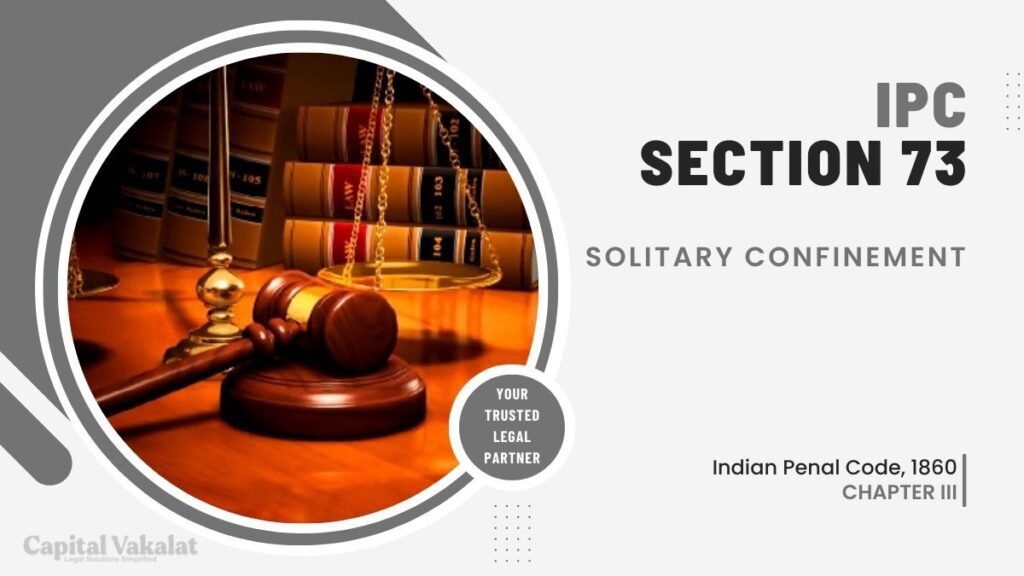In the realm of criminal justice, the concept of solitary confinement has long been a subject of controversy and debate. Section 73 of the Indian Penal Code (IPC) addresses the legal aspects of solitary confinement.

This article aims to provide an in-depth understanding of Section 73 IPC, its implications, and the various dimensions surrounding this contentious practice.
Understanding Section 73 IPC
What Is Section 73 IPC?
Section 73 IPC, also known as “Solitary Confinement,” is a legal provision that outlines the conditions under which an incarcerated individual can be subjected to isolation within a prison setting. It primarily serves as a disciplinary measure and is regulated by certain guidelines to prevent abuse.
Conditions for Solitary Confinement
Solitary confinement, as per Section 73 IPC, can be imposed under specific circumstances, such as:
- Misconduct: When a prisoner engages in serious misconduct or violates prison rules, solitary confinement may be used as a punitive measure.
- Protection: In cases where the authorities believe that a prisoner’s safety is at risk from fellow inmates, solitary confinement may be employed to ensure their protection.
Duration of Solitary Confinement
The duration of solitary confinement is a critical aspect regulated by Section 73 IPC. It stipulates that the maximum period of isolation should not exceed three months. This limitation is in place to prevent excessive and potentially harmful isolation of prisoners.
Controversies Surrounding Solitary Confinement
Psychological Impact
Solitary confinement is often criticized for its severe psychological impact on inmates. Extended periods of isolation can lead to anxiety, depression, hallucinations, and even psychosis. Human rights advocates argue that such practices can amount to cruel and unusual punishment.
Ethical Concerns
There are ethical concerns associated with solitary confinement, particularly regarding its potential for abuse. Without proper oversight and safeguards, there is a risk of using isolation as a form of retaliation or excessive punishment, which goes against the principles of justice and human rights.
Alternatives to Solitary Confinement
Many argue for the need to explore alternatives to solitary confinement. Some correctional facilities have adopted rehabilitation and counseling programs as more humane ways to address inmate misbehavior. These alternatives aim to reintegrate prisoners into society successfully.
Legal Safeguards
Judicial Review
To prevent abuse, Section 73 IPC mandates that any decision to impose solitary confinement must be subject to judicial review. This ensures that the practice is not used arbitrarily or excessively.
International Standards
India is a signatory to international agreements that protect the rights of prisoners. These standards, such as the United Nations Standard Minimum Rules for the Treatment of Prisoners (the Mandela Rules), emphasize the humane treatment of inmates, including restrictions on solitary confinement.
Conclusion
Section 73 IPC, addressing solitary confinement, is a complex and contentious legal provision. While it serves as a tool for maintaining order within correctional facilities, it also raises significant ethical and human rights concerns. Striking a balance between maintaining discipline and upholding the dignity and mental well-being of prisoners remains a critical challenge in the realm of criminal justice.
FAQs
What are the psychological effects of long-term solitary confinement?
Extended solitary confinement can lead to severe psychological effects, including anxiety, depression, and hallucinations.
Are there any international guidelines on the use of solitary confinement?
Yes, international standards like the Mandela Rules provide guidelines for the humane treatment of prisoners, including restrictions on solitary confinement.
Can prisoners appeal their solitary confinement?
Yes, prisoners have the right to judicial review of their solitary confinement, ensuring that it is not used arbitrarily.
Are there any alternatives to solitary confinement in Indian prisons?
Some correctional facilities in India have adopted rehabilitation and counseling programs as alternatives to solitary confinement to address inmate misbehavior and promote reintegration into society.